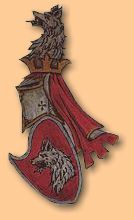The Balsics
Serbian: Balsic /Ba:lshitch/
 |
COAT OF ARMS DETAILS |
The very first written document relating to the Balsics family is in the chart of Uros issued to the Republic of Dubrovnik from 1360. We do not know for sure of their origin but their name is suggesting Roman origin which led many historians to believe that they came form Naples.
The founder of the family, Balsa I, was controlling one village only but with the help of his sons, he conquered Gornja Zeta and the following towns: Skadar, Kotor and most probably Bar. They fought Albanian nobleman Carlo Topi who captured Djuradj and liberated him in 1366 when they reached the peace. Already in 1368 Djuradj is controlling Ulcinj and being so powerful he rejected king Uros as his master and becomes his enemy. Djuradj is mentioned with prince Lazar as the organiser of the religious convention of 1375 which proves that he was very powerful and influential nobleman of his time.
His youngest brother Balsa II becomes the next heir and
he defeated the forces of king Tvrtko and makes peace with him
with the assistance of Venice in 1385.The Turks started to
invade his lands and he gets killed in the battle of Satursko
polje the same year (1385). The grandson of Balsa I, Djuradj, is
the next heir and at first he becomes the ally of the Turks but
later he turns to the Catholics and becomes the enemy of the
Turks leaving all his lands to the pope Bonifacius IX if he does
not produce an heir. His son, Balsa III, started to conquer the
old lands of the family and with the help of the Turks he
captures Skadar. Being successful negotiator he manages to
balance his power among Venice, Hungary and the Turks but after
he dies at the court of his uncle, prince Stefan
Lazarevic (who became the heir to the Balsics' lands) Venice
captures all their territories.